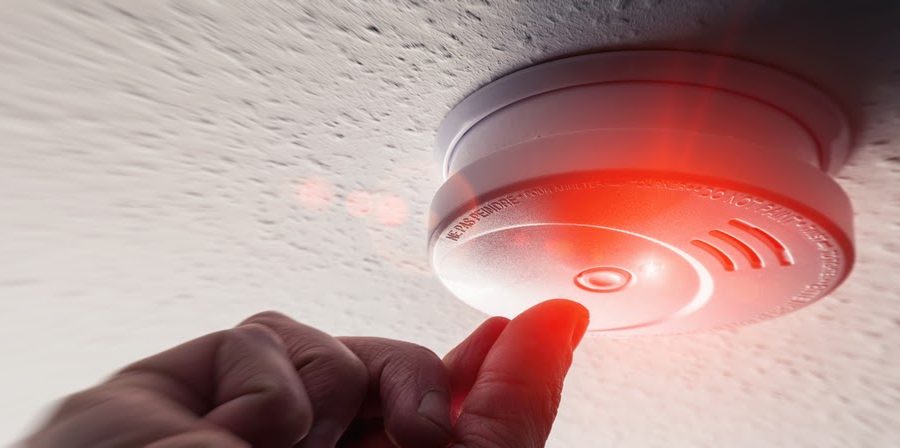
Smoke Alarm Compliance for 2024: Guide
If you’re thinking of selling your house in 2024, you must be aware of the new smoke alarm legislation that came into effect in 2022. The new law requires homeowners in Queensland to have interconnected photoelectric smoke alarms installed in their homes. In this article, we will provide you with all the necessary information about the smoke alarm compliance guidelines for selling your home in Queensland in 2024.

What Are The Rules for Smoke Alarm Compliance When Selling Your House?
Under the new legislation, you, as a seller or vendor, must disclose to the buyer at the time of the contract whether or not compliant smoke alarms are installed on the real property. The buyer is also entitled to an inspection by a professional, licensed electrician before the settlement to determine whether the smoke alarms are compliant. If the smoke alarms are not compliant by the settlement, it does not give the buyer the right to cancel the contract, but they will be entitled to a reduction of 0.15% of the purchase price, where stipulated in the contract. Which could cost the seller thousands of dollars depending on the sale price on the contract of sale.
Form 24 Disclosure for Smoke Alarm Compliance
It is also mandatory for the seller to disclose at the settlement whether complying smoke alarms have been installed. This is done on the Form 24 Transfer of Title form, which is lodged with Titles Queensland as part of change of ownership and part of the conveyancing process. The Queensland Fire and Emergency Services can access this information, so it’s crucial to ensure that your smoke alarms are compliant.
What Happens if You Fail to Comply with Smoke Alarm Legislation?
It is essential to note that failure to have compliant smoke alarms installed is an offense, even if it has been disclosed to the buyer. Not only that, but the failure to comply with smoke alarm legislation may also lead to fines, penalties or insurance being void. Therefore, it is vital to ensure that your home is compliant with the smoke alarm legislation when selling your home in Queensland.
Smoke Alarm Requirements for Compliance When Selling Your House To comply with the new legislation, smoke alarms must be installed in the premises:
On each floor
In each bedroom
If there are no bedrooms on a floor of the house, at least one smoke alarm must be installed in the most likely path of travel to exit the dwelling.
If there is no hallway, between the bedroom and other parts of the floor
Additionally, the smoke alarms must be:
Photoelectric and not contain an ionization sensor
Hardwired into the mains power supply, if currently hardwired. Otherwise, smoke alarms can be either hardwired or powered by a non-removable 10-year battery or a combination of both
Interconnected with all other smoke alarms in the residence, so when one is activated, they all are
Compliant with Australian Standards
Less than 10 years old
Working when tested
Landlords’ Responsibilities for Smoke Alarm Compliance
Landlords are responsible for ensuring that their rental properties comply with smoke alarm legislation. This includes testing and cleaning all smoke alarms before the start of a new tenancy or the renewal of an existing tenancy. Or minimum of every twelve months, where a lease may be greater than 12 months. The tenant is responsible for cleaning and testing the smoke alarms at least every year and for alerting the agent or property manager or real estate agent if there are any issues.
What to Look Out for with Smoke Alarm Compliance as a Buyer in QLD
As a buyer in Queensland, it is important to ensure that the property you are purchasing complies with the smoke alarm legislation. Here are a few things to look out for when assessing the smoke alarm compliancy of a property:
Location of Smoke Alarms: Check the location of the smoke alarms in the property. In Queensland, smoke alarms must be installed in all bedrooms, hallways that connect bedrooms and the rest of the dwelling, and on every level of the property. Ensure that the smoke alarms are installed in the correct locations and are interconnected as required.
Compliance Certificate: Ask the seller to provide a smoke alarm compliance certificate, which confirms that the smoke alarms have been installed correctly and comply with the QFES legislation. Review the certificate to ensure that it includes the necessary details such as the type and location of the smoke alarms, the date of installation, and the name and license number of the installer. If you haven’t received this when you signed the Contract of sale, ask your Conveyancer to request a copy from the sellers.
Maintenance: Ask the seller about the maintenance of the smoke alarms in the property. Smoke alarms should be tested at least once a month to ensure they are working correctly, and the batteries should be replaced every year or as per the manufacturer’s instructions. Ensure that the seller has maintained the smoke alarms and that they are in good working condition.
When purchasing a property in Queensland, it is important to ensure that the smoke alarms are installed in compliance with the QFES legislation, a smoke alarm compliance certificate is provided, and the smoke alarms have been maintained and are in good working condition. By keeping these points in mind, you can ensure that the property you are purchasing is safe and compliant with smoke alarm legislation.
FAQ
Q: Do I need to have smoke alarms installed in my property before selling it in Queensland?
A: Yes, you must have smoke alarms installed in your property in accordance with the Queensland Fire and Emergency Services (QFES) legislation.
Q: What are the requirements for smoke alarm installation in Queensland?
A: The QFES legislation and regulations requires smoke alarms to be installed in all bedrooms, hallways that connect bedrooms and the rest of the dwelling, and on every level of the property. The smoke alarms must be interconnected and installed in compliance with the Australian Standard (AS) 3786-2014.
Q: Who is responsible for ensuring smoke alarms are compliant in a property sale?
A: It is the responsibility of the property owner or vendor to ensure that smoke alarms are compliant and installed in the correct locations prior to the sale of the property and for the buyer to conduct a smoke alarm inspection to ensure the alarms are compliant prior to settlement and change of ownership.
Q: What if my property does not comply with smoke alarm legislation in Queensland?
A: If your property does not comply with the QFES legislation, you must have the smoke alarms upgraded and installed in compliance with the legislation before selling the property.
Q: Are there any exemptions to smoke alarm compliance in Queensland?
A: No, there are no exemptions to the smoke alarm legislation in Queensland, except for specific types of properties, such as certain boarding houses, hostels, and other similar accommodations.
Q: Who can install smoke alarms in my property?
A: Smoke alarms can be installed by a licensed electrician, a licensed smoke alarm installer, or the property owner, as long as they have the necessary skills, experience and knowledge to do so.
Q: How often should smoke alarms be tested and maintained?
A: Smoke alarms should be tested at least once a month to ensure they are working correctly. They should also be cleaned at least twice a year to remove any dust or debris that may affect their operation. Additionally, the batteries should be replaced every year, or according to the manufacturer’s instructions.
Q: Do I need to provide a smoke alarm compliance certificate when selling my property?
A: Yes, you must provide a smoke alarm compliance certificate to the buyer when selling your property, which confirms that the smoke alarms are compliant with the QFES legislation.
Q: Is smoke alarm legislation the same between different states and territories in Australia for example between Queensland and New South Wales?
A: No, smoke alarm legislation can differ between different states and territories in Australia. It is important to check the legislation in your specific location to ensure compliance.
Q: Does smoke alarm legislation differ between body corporates, including apartments and townhouses, commercial property, and standard residential Property?
A: Yes, the smoke alarm legislation can differ between different types of properties and buildings. For example, in Queensland, the requirements for smoke alarm installation are different for residential properties, short-term rental accommodation, and boarding houses. In some cases, body corporates may also have specific requirements for smoke alarm installation and maintenance. It is important to check the legislation and requirements for your specific property type to ensure compliance.
Q: Can I cancel the contract in QLD if smoke alarms aren’t compliant or get my deposit back as a buyer?
A: No, in Queensland, if the smoke alarms in the property are not compliant with the QFES legislation at the time of settlement, it does not give the buyer the right to cancel the contract, but they will be entitled to a reduction of 0.15% of the purchase price. However, it is important to review the terms of the contract and seek legal advice to understand your rights and obligations as a buyer.
Q: What documents do I need to prove the smoke alarms are compliant in QLD?
A: In Queensland, to prove that the smoke alarms in your property are compliant with the QFES legislation, you will need a smoke alarm compliance certificate. This certificate is issued by a licensed electrician or smoke alarm installer and confirms that the smoke alarms have been installed and interconnected correctly, and that they comply with the Australian Standard (AS) 3786-2014. The certificate should include the details of the installation, including the type, description and location of the smoke alarms, the date of installation, and the name and license number of the installer and if there is any warranty. You will need to provide this certificate to the buyer when selling your property.
Q: Are compliant smoke alarms required on vacant subdivisions (proposed lots) or vacant land contracts?
A: No, compliant smoke alarms are not required on vacant land contracts in Queensland.
Q: Can I negotiate a reduced rate of stamp duty if the property has compliant smoke alarms?
A:No, compliance with smoke alarm legislation does not affect the stamp duty payable on a property in Queensland. Stamp duty is a tax imposed by the state government on certain transactions, such as property purchases, and is calculated based on the value of the property. Smoke alarm compliance is a separate matter that relates to the safety of the property and the obligations of the owner to ensure that the property is compliant with the QFES legislation.
If you’re planning on selling your home in 2024, make sure that your home is compliant with the smoke alarm legislation. Remember to disclose to the buyer whether or not there are compliant smoke alarms installed on the property, and ensure that your smoke alarms are compliant before the settlement. Failure to comply with smoke alarm legislation may result in fines and penalties, so it’s essential to take this seriously. By following these guidelines, you can ensure that you’re selling your home legally and safely.
If you require information about whether your house is compliant with new Smoke Alarm legislation, in Brisbane we recommend contacting DC Electrical https://www.dceq.com.au/
Or this article for more information
This is general advice only, for specific legal advice please contact your legal expert or solicitor.





